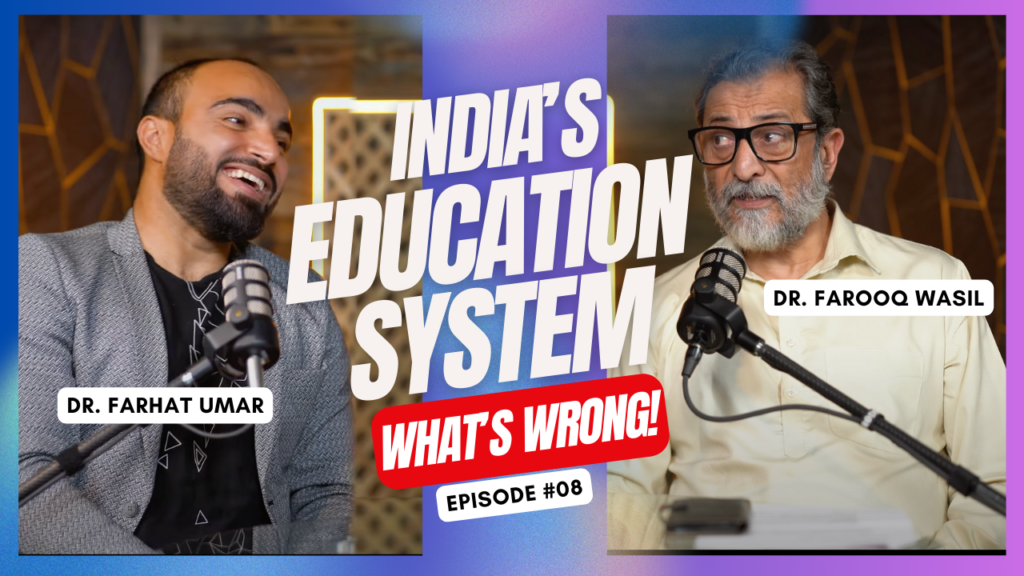In the world of education, few names command as much respect as Dr. Farooq Wasil. With over 40 years of experience, this award-winning educator has left an indelible mark on schools across geographies. My recent conversation with him on The Valley of Wisdom Podcast (valleyofwisdom.com) was nothing short of enlightening, offering a fresh perspective on the education system in India, Kashmir, and beyond.

Education: A Birthright, Not a Privilege
One of the key points Dr. Wasil emphasized during our discussion was that education should be a birthright, not a privilege. He critiqued the current system in India and Kashmir, highlighting how it favors brighter students while neglecting those who struggle. “The system’s focus on the top performers leaves the majority behind,” he said, shedding light on a problem that many of us in education often overlook.
Dr. Wasil compared this with countries like Singapore, Korea, and Dubai, where the education systems have evolved to include everyone, ensuring no child is left behind. He highlighted that intentions without implementation are meaningless. For instance, while the Kotari Commission (1964) and the National Education Policy (NEP) lay out admirable goals, the lack of accountability has stifled real progress.
The Dependency on Coaching Centers
Dr. Wasil also brought up an important issue I hadn’t fully considered: the dependency syndrome. He described how students have become increasingly reliant on coaching centers, particularly in regions like Kashmir, where success in exams is often viewed as the ultimate goal. “We’ve created a system where students depend on coaching rather than cultivating independent thinking,” he explained.
This dependency on coaching centers ultimately limits opportunities for many, leading to a population that is trained for exams but unprepared for real-world challenges. It made me reflect on how this system fails to produce the kind of creative, problem-solving individuals the future demands.
Rethinking the Role of Schools
Dr. Wasil’s thought-provoking question—“Are schools really necessary?”—stood out to me. While it might seem radical, his point was not to eliminate schools but to challenge the traditional role they play. He suggested that education is failing to stimulate young minds, leaving students disengaged and uninspired. Schools, he argued, need to be reimagined as environments that encourage curiosity and creativity, not just compliance.
He also explored the potential of homeschooling, an option that, while demanding, could better meet the needs of students who aren’t thriving in traditional school settings. His argument was that education should cater to individual needs, not force students into a rigid system.
The Language of Education and the Role of Teachers
A striking point in our conversation was Dr. Wasil’s critique of English-medium education. He questioned the emphasis on English over local languages and cultures, suggesting that this approach often comes at the cost of losing one’s cultural identity. “We’re forgetting the value of local language and culture in the race to master English,” he noted.
Dr. Wasil also touched on the role of teachers, urging them to constantly seek improvement. “A teacher’s job isn’t just to teach, but to keep learning,” he said. He emphasized that teachers need to inspire their students, not simply deliver information. This resonated deeply with me as I thought about how often teaching is seen as a one-way process, when in fact, it should be a dynamic exchange that evolves with feedback and reflection.
Debunking Myths About Learning
One of the most illuminating parts of our conversation was when Dr. Wasil debunked several common myths about learning. Here are a few that stood out:
- “School is the best place to learn”: Dr. Wasil pointed out that much of what shapes us, such as discipline and teamwork, is learned outside the classroom.
- “Teaching automatically results in learning”: He explained that without proper assessment and feedback, teaching alone doesn’t guarantee understanding.
- “We all learn the same way”: Dr. Wasil highlighted the importance of recognizing individual learning styles and abilities. A one-size-fits-all approach simply doesn’t work.
- “Learning is about memorization”: He criticized rote learning, calling for a shift towards understanding and critical thinking.
A Call for Holistic Education
Dr. Wasil concluded our discussion by advocating for a holistic education system. He argued that education shouldn’t just be about academics but should also focus on physical, emotional, and social development. The aim should be to prepare students not just for exams but for life itself. He emphasized that collaboration between teachers, parents, and students is key to creating an environment where children can thrive and grow into well-rounded individuals.
His vision for education is one that equips students with the skills and confidence to navigate an ever-changing world, rather than preparing them for a future that no longer exists. This holistic approach, he believes, is crucial for shaping the leaders, innovators, and thinkers of tomorrow.
Final Thoughts: Learning from a Master
My conversation with Dr. Farooq Wasil left me with much to think about. His insights on the failings of our current education system, the over-reliance on coaching, and the need for a more inclusive and stimulating learning environment are timely and necessary. His passion for transforming education to make it more holistic and future-ready inspired me to rethink my own approach to teaching and learning.
As Dr. Wasil so aptly put it, “Education is not just about producing top performers, it’s about nurturing every student to reach their potential.” This simple yet profound truth is something we must all carry forward as we work towards a better, more inclusive education system for all.